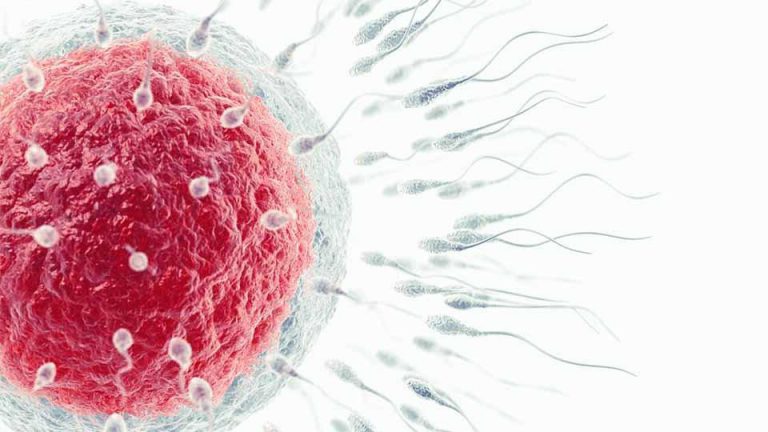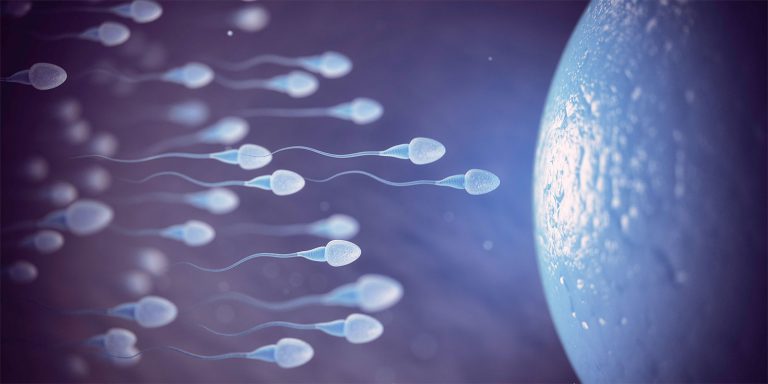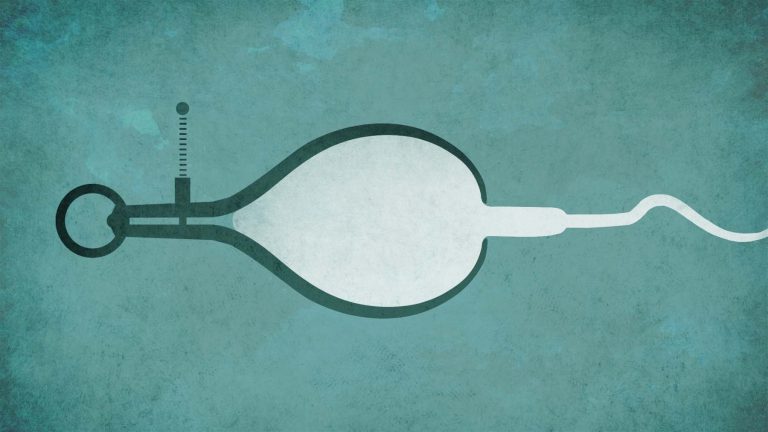This is a guest post by Annina Burns, PhD, RD, and founder of Simplina. Annina Burns will be joining Dr. Kristin Brogaard, co-founder, of Path, in a free webinar focused on Male Fertility September 21st. Click here for more information.
Too often we associate the word “fertility” with the word “women”. But it takes two to tango and men are just as important in the fertility equation.
Did you know that up to half of the fertility issues are due to male factor infertility? Yet men are too often entirely overlooked.
Male fertility testing
The good news? There is advanced testing men can do to figure out the quality of their sperm and biological age. The good news about the test? There are specific lifestyle changes using functional medicine—such as food, supplements, exercise, and sleep—that can be designed specifically for men to improve their sperm’s biological age.
In our free upcoming webinar: Men Matter: Improving Male Fertility with Advanced Testing, Functional Medicine & Nutrition I will join Dr. Kristin Brogaard to talk about the science behind detecting your sperm age and how you can use lifestyle change to make you (and your sperm) younger.
Is male fertility affected by age?
Yes, male fertility is affected by age. It’s true that unlike women, men can father children late in life—but that’s an exception and not the rule. There are the famous male celebrities that have children much later, but most guys need to remember (like women) that celebrities don’t have an average lifestyle.
Increasing male age has consistently been linked to a harder time getting pregnant in various studies. As men age, they have an uptick in risk of medical conditions that affect fertility. However, healthy, older men experience fertility issues, too. So what are the culprits?
Decreased sperm motility. Motility is the ability of the sperm to move toward the egg. Sperm motility decreases with age, scientifically known as asthenospermia. In a 2017 study, researchers looked into potential correlations between male age and different sperm parameters. They conducted semen analyses on 2681 male patients who underwent semen analysis. They found that males aged 31+ years were more likely to have decreased sperm motility.
Decreased sperm morphology. Sperm morphology is defined as the size and shape of sperm. Several studies show significant declines in normal sperm morphology of 0.2% to 0.9% per year of age. This gradually results in a 4% to 18% decrease in normal morphology over a 20-year period.
In a Massachusetts Male Aging Study (MMAS), sexual functioning and intercourse frequency were examined in 1290 males aged 40 to 70 years. Between the ages of 40 and 70, the likelihood of developing severe ED tripled, while the likelihood of developing moderate ED doubled.
Sexual frequency was measured in 1085 men from the same cohort during a 9-year period.
Researchers found that men engaged in sexual activity an average of 6.5 times per month prior to the age of 40, one to two times per month after the age of 50, and one to two times per month beyond the age of 60, after controlling for baseline sexual function.
Age is a number, and your biological age or “true age” is what matters for sperm
One of the hardest things about dealing with infertility is when your physician’s office asks, “How old are you?” It might feel like a diagnosis or a judgement call for your fertility odds based on your age alone
But there is actually good news: the number of years you have been alive isn’t the end all and be all. Tom Brady is better than quarterbacks half his age. Why? His lifestyle. I’ve discussed this in my blog on biological versus chronological age and will do a quick lowdown here.
Chronological age: The amount of time you have been alive. The number on your driver’s license.
Biological Age: The age at which your body functions. You can be 35 but have a biological age of 25.
Genes play a role, but they are not the end all and be all. Remember, even with “good genes” you can live an unhealthy lifestyle and not manifest your genetic potential. Or you could have a number of genetic risk factors for disease, but be doing fabulously because you focus on managing your risk and taking care of your body.
There is an emerging field of science trying to track biological age. There are a few telltale biomarkers that can be drawn from a blood sample or saliva.
DNA Methylation is one area scientists are reviewing to look for biological age. DNA methylation is essential for embryonic development, genomic imprinting, and chromosome stability, all of which influence age. Studies show that different body tissue parts can have different “ages” based on DNA methylation. This is what’s really cool about PATH’s test and why I use it: it’s looking at your sperm to get your “true age.” This is critical info for discovering your biological age.
What lifestyle causes male infertility?
How you live matters. The great news about biological age is that, unlike your birthdate, it’s not set in stone. For men, what you eat, how often you move, and how well you sleep plus what you’re exposed to in your home all matter for sperm.
The standard lifestyle of not working out regularly, eating junk food, and not getting your body to sweat and move can contribute to infertility and poor sperm quality over time. Yet you CAN improve your sperm quality by eating a nutrient-rich diet, with fertility supporting foods and supplements, and exercising moderately and regularly.
How can nutrition help sperm quality?
What you eat matters for sperm. A high-fat diet resulting in being overweight can impact the shape of sperm, but also the total concentration and movement.
In a 2017 study, researchers examined the associations between periconceptional dietary patterns and semen quality parameters in 129 men. Researchers found that there was a positive association between strong adherence to a healthy dietary pattern and improved semen parameters in men with poor semen quality.
Healthy eating patterns are linked to increased sperm quality and a decreased chance of abnormalities in sperm quantity, concentration, and motility, as well as fewer sperm DNA fragmentation.
Foods to increase male fertility/ What nutrients increase male fertility?
What you need to eat is dependent on your body type and personal nutrient needs. At a basic level, a rich colorful Mediterranean diet can help with getting the nutrients you need. There are certain minerals such as zinc and selenium as well as omega-3 fatty acids and antioxidants that can improve sperm quality and quantity. These nutritions function by reducing oxidative stress and inflammation, which impact your sperm age. Other nutrients that improve energy production including supplements like Coenzyme Q10 can also be used.
What type and how much exercise can improve male fertility?
More is better when it comes to exercise, right? Not always.
That might be true with getting the six pack, but not with fertility. You gotta come right down the middle with exercise. Referenced in my previous blog, “Shake Your Body! How Exercise Can Help You Get Pregnant—At the Right Intensity” while moderate physical activity can improve fertility odds in both men and women, there is evidence to suggest that intense and vigorous exercise overtime can have a negative impact on sperm.
Moving regularly and getting outside is a good thing.
Men who spent more than an hour and a half each week engaging in physical activity outdoors had a 42% higher sperm concentration than those who spent no time outdoors. In addition, weightlifters who spent two or more hours a week pumping, had a 25% increase in sperm count compared to men who did not lift weights.
What environmental factors could harm sperm?
One thing that always surprises the couples I work with is that products in their own home can be harming their fertility.
I share with my clients how what you use on your body and even what you cook your food in can impact your fertility. If you have read about plummeting sperm counts and wondered why, just know the environment and your exposure to fertility disrupting chemicals impact men just as much as women.
Several studies suggest that there are strong indications that environmental exposures (pesticides, phthalates, PCBs, air pollution, trihalomethanes—THMs which are a byproduct of chlorinated drinking water—and mobile phones) have a negative impact on semen quality.
Exposure to environmental chemicals has been shown to increase the concentration of the chemical components in semen. This indicates that environmental factors can affect the biochemical composition of semen.
Even poor air quality also has an impact on sperm. A decline in normal sperm shape and size was linked to every 5 microgram per cubic meter of small particulate matter in men. Air pollution affected the ability of sperm to migrate properly in a Taiwanese study. Air pollution has been associated with DNA breakage in sperm, which can lead to infertility and miscarriage. Air quality is also not just a problem in cities; wildfires, the chemicals used to put them out and excessive heat also lower the quality of the air.
What to do now to improve sperm quality?
Change your lifestyle and get healthier. Being healthy isn’t just about hitting the gym more often. You gotta put it all together. I’ve highlighted a few key general tips above on food, supplements, exercise and greening your home. But what YOU need to do is specific to YOUR body.
To make an impact on your sperm health, it is best to have a fertility program tailored to your needs and your partner.
At Simplina, we make it easier for you to improve your sperm and your partner’s egg health. How? We have an 8-step virtual coaching program where we review your test results including PATH, customize a plan, and take you through the process of changing your lifestyle— everything from food, supplements, sleep, stress and the home.
The good news? You never need to leave your home so you can use the extra time to be healthier and get the support you need for both of you. Our program can be done for IVF or without IVF. The side effect? Both of you get a lot healthier!
Learn more about it at the free webinar Men Matter, Thursday 9/23 at 2 pm EST.
Contact Dr. Annina Burns by visiting Simplina.







